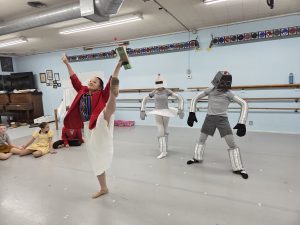This fall, Mission College welcomed its first ever Firefighter 1 Academy. Though it’s still working toward becoming an official Accredited Regional Training Program (ARTP), the class is slated to fill a large need in training future Bay Area firefighters.
“There are not many ARTPs, those accredited training centers, in community colleges across California,” said Ryan Cronin, the retired firefighter who leads the Firefighter 1 Academy. “There’s one in the Central Valley; there’s one in LA, but we’re missing one in the Bay Area and that’s what we’re going to be.”
Hundreds of people applied to be a part of this first class, but there was only space for 30 students. What’s resulted is a class of top-notch fire recruits, many of whom have bachelor’s degrees or experience as EMTs.
“They’ve not just dipped their toe in the water, they dove into the water,” said Cronin.
Christopher King is a former Marine with a bachelor’s degree in kinesiology. He says when he heard about the academy, he knew it was another step toward his goal of becoming a firefighter.
“I figured that it’d be a good opportunity to do it prior to getting hired at a department. So, that way I could have the exposure and get a feel for how the academy would be run once I get a department,” said King.
Sean Pham has a bachelor’s degree in engineering. He wanted a job that was more active than sitting in an office, so he spent his COVID-19 quarantine earning his associate’s degree for firefighting. He says he’s happy to put what he’s learned into practice.
“It’s great, because now I’m one step closer in a very long process. [I’m] one step even closer to my goal,” said Pham.
Commitment to the Firefighter 1 Academy is equivalent to a full-time job. Students spend most of their weekdays on campus taking part in the class as well as fulfilling separate physical training requirements. Each participant also spends their own money to rent all the PPE a typical firefighter would receive from his or her fire agency.
The 16-week course is based on the state fire training program. It will help students prepare for structural fires, wildland firefighting and hazardous materials response as well as teach them things like the structure of command and firehouse safety. Even the most mundane tasks will be practiced repeatedly to make sure the students are ready for real-life situations.
“There’s a lot of opportunity for injury. Stepping on and off an apparatus, we practice that. These are the kind of basic motor skills that they will need to develop so that they can do it without even thinking and they can do it very efficiently,” said Cronin. “[When they] get to the scene, there’s a lot of other things going on they’re going to need to pay attention to. This should be so rote and ingrained in them, they can do it with their eyes closed. Literally, with their eyes closed.”
While preparation and safety are the most important aspects of the Firefighter 1 Academy, Cronin says completing the course will give each of his students an advantage when they start looking for a job.
“Realistically, you have to look at the competition because it fluctuates by year, but there’s anywhere from 500 to 1,000 applicants per position,” said Cronin. “So, having the Firefighter 1, even if it’s not required, puts them that much more ahead.”
Students also get the benefit of local knowledge. The Firefighter 1 Academy draws guest instructors from fire agencies all over the San Francisco Bay Area including the Santa Clara Fire Department.
“[There are] two benefits. We get people with relevant current experience, and they get eyes on people,” said Cronin. “The applicants still have to go through those traditional processes [and testing]…as they get past that testing and then they get into the interview, well, now that personal experience and who they are is what comes out.”
The Firefighter 1 Academy will be held at Mission College every Fall and Spring.












0 comments